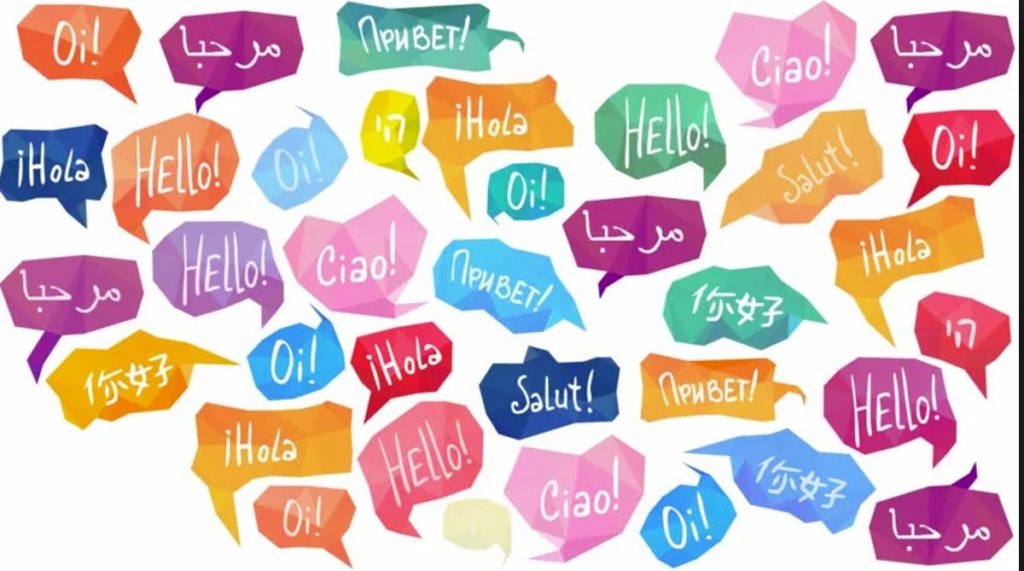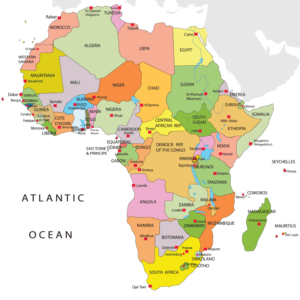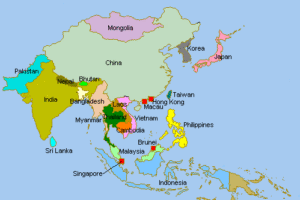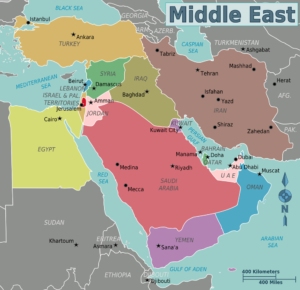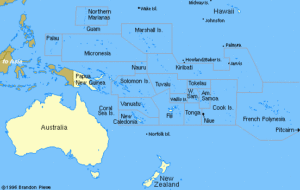A greeting is often the first point of call for human communication, and should be the first phrase you learn from any foreign language. Opening a conversation with a greeting is polite and shows willingness to communicate. Don’t be nervous about saying hello as the effort will usually be appreciated even if you don’t get it quite right! Reading how to greet others in many languages is both rewarding and fun, so here’s a handy list of how to say hello in 100 languages, along with the phonetic pronunciation.
Hello in 100 languages, sorted by continent in alphabetical order.
Africa
Spread over at least six major language families, Africa’s language diversity is incomparable to the rest of the world and includes huge tonal diversity, and even the use of clicks and unique mouth movements to help articulate phrases in certain contexts. Saying ‘Hello’ at least, is fortunately often easy to pronounce!
Afrikaans
- hallo (hah-loh) — hello
Amharic
- tena jistilign (teh-nah yihst-ihl-ihgn) — hello (formal)
- selam (sae-lahm) — hello (informal)
Chichewa
- moni (moh-nee) / muli bwanji (moo-lee bwahn-jee) — hello
Hausa
- salama alaikum (sah-lahm-ah ah-lai-koom) — hello (formal)
- sannu (sahn-noo) — hello (informal)
Igbo
- ndêwó (in-deh-woh) — hello (formal)
- kèdú (keh-doh) — hello (informal)
Kinyarwanda
- muraho (moo-rah-hoh) — hello
- bite (bee-teh) — hello (informal)
Lingala
- mbote (mboh-teh) — hello
Luganda
- ki kati (kee kah-tee) — hello (informal)
Malagasy
- manao ahoana (man-ow ah-ohn-ah) / salama (sah-lAHm-ah) / akory (ah-kOO-ree)
- miarahaba (mee-arah-hah-bah) — hello
Ndebele
- salibonani (sah-lee-boh-nah-nee) — hello
Northern Sotho
- dumêlang (doo-meh-lang) — hello
Oromo
- ashamaa (ah-shah-maa) — hello
- attam (aht-tahm) — hello (informal)
Sesotho
- dumela (doo-meh-lah) — hello
Shona
- mhoro (mhoh-roh) — hello (singular)
- mhoroi (mhoh-roh-ee) — hello (plural)
Swahili
- jambo (jahm-boh) — hello
- hujambo (hoo-jahm-boh) — hello
Swati
- sawubona (sah-woo-boh-nah) — hello
Tigrinya
- selam (seh-lahm) — hello
Tsonga
- avuxeni (ah-voo-sheh-nee) — hello (greeting)
- ahee (ah-hee) — hello (response)
Tswana
- dumela (doo-meh-lah) — hello
Wolof
- salaam aleekum (sah-laam ah-ley-koom) — hello
Xhosa
- molo (maw-law) — hello
Yoruba
- bawo (bah-woh) — hello
Zulu
- sawubona (sah-woo-boh-nah) — hello
Asia
Aside from Turkic languages of Central Asia and some Asian languages that were influenced by European colonization, most Asian languages are astoundingly unique and diverse, and there’s less common ground shared with other major language families.
Thai, Lao, Cambodian, Vietnamese, Cantonese, Japanese and Chinese are tonally varied languages, meaning as you speak, pitch changes dramatically alter the meaning of words and phrases. By observing native speakers, you can hear how certain phrases, including greetings, are articulated in their native natural ways.
Armenian
- barev dzez (bah-REV DZEZ) — hello
- barev (bah-REV) — hello (informal)
Azerbaijani
- salam (sah-lam) — hello
Bengali
- nômoshkar (naw-mo-shkar) — hello (for Hindus)
- assalamualaikum (ahs-sah-lahmoo-ah-lay-koom) / salam (sah-lahm) — hello (for Muslims)
Burmese
- mingalarba (min-ga-la-ba) — hello
Cambodian
- chum reap suor (*) — hello (formal)
- sous-dey (*) — hello (informal)
Cantonese
- néih hóu (*) — hello
Chinese
- nǐ hǎo (nee how) — hello
Dzongkha
- kuzu-zangpo (koo-zoo-zang-poh) — hello
Georgian
- gamarjoba (gah-mahr-joh-bah) — hello
Gujarati
- namaste (nah-mah-steh) — hello
- kem cho (kem-choh) — hello (lit. How are you?)
Hindi
- namaste (nah-mah-steh) — hello
Indonesian
- halo (hah-loh) — hello
Japanese
- konnichiwa (kohn-nee-chee-wah) — good afternoon / hello
Kannada
- namaste (nah-mah-steh) / namaskāra (nah-mah-skah-rah) — hello
Kazakh
- sälemetsiz be? (sah-lem-met-siz beh) — hello (formal)
- sälem (sah-lem) — hello (informal)
Korean
- annyeonghaseyo (an-nyee-ong-hah-seh-yo) — hello (formal)
- annyeong (ah-nyee-ong) — hello (informal)
Kyrgyz
- salamatsyzby (sah-lam-aht-seez-bee) — hello (formal)
- salam (sah-lam) — hello (informal)
Lao
- sabaidee (sah-bai-dee) — hello
Malay
- selamat pagi (se-lah-maht pah-gee) — good morning
- selamat petang (se-lah-maht pe-tahng) — good afternoon
- selamat malam (se-lah-maht mah-lahm) — good night
- hello (he-loh) — hello
- hai (hai) — hello (informal)
Malayalam
- namaskaram (nah-mah-skahr-ahm) — hello (formal)
- aay (ah-yeh) — hello (informal)
Mongolian
- sain baina uu (sain bai-na OO) — hello
Nepali
- namaste (nah-mahs-teh) — hello
Pashto
- salaam (sah-lahm) — hello
- khe chare (KHEH chah-reh) — hello (informal)
Punjabi
- sat sri akal ji (saht sree ah-kahl jee) — hello (formal, Sikh)
- asalamwalaykum (ah-sah-lahm-wah-lay-koom) — hello (formal, Muslim)
- sat sri akal (saht sree ah-kahl) — hello (informal, Sikh)
- salaam (sah-laam) — hello (informal, Muslim)
Sinhala
- āyubōvan (ah-yuh-boh-van) — hello (formal)
- halō (ha-loh) — hello (informal)
Tagalog
- kumusta? (koo-moos-ta) — hello
- helów (hey-LOW) — hello (informal)
Taiwanese Hokkien
- lí-hó (lee-hoh) — hello
Tamil
- vaṇakkam (vah-nahk-kahm) — hello
Tatar
- isänmesez (ees-aen-meh-sehz) / sawmısız (saw-mis-siz) — hello
- sälam (sae-lahm) — hello (informal)
Telugu
- namaskārām (nah-mahs-kaar-am) — hello
Thai
- sà-wàt-dee (*) — hello
Tibetan
- tashi delek (tah-shee del-ek) — hello
Urdu
- āssālam ‘alaykum (ahs-sah-lahm ah-lay-koom) — hello (greeting)
- wālaikum assalām (wah-lay-koom ahs-sah-lahm) — hello (response)
- salām (sah-lam) — hello (informal)
Uyghur
- ässalamu läykum (aes-sah-lahm-oo lae-koom) — hello (greeting)
- wä’äläykum ässalam (wae-aelae-koom aes-sah-lahm) — hello (response)
- yahshimusiz (yah-shih-moo-sihz) — hello (informal)
Uzbek
- assalomu aleykum (ahs-sah-lo-moo ah-lay-koom) — hello (formal)
- salom (sah-lom) — hello (informal)
Vietnamese
- xin chào (sin chow) — hello
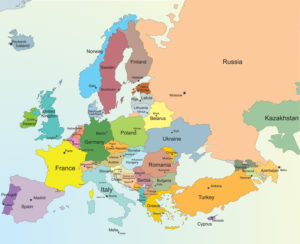
Europe
Romance, Germanic and Slavic languages are the three major Indo-European language families and there is a lot of overlapping vocabulary and word formation. Through the Latin and Greek formations and derivations of many words and phrases, you will see many similarities between the European greetings in this list.
Albanian
- tungjatjeta (toon-jah-TYEH-tah) — hello (formal)
- tjeta (TYEH-tah) — hello (informal)
Basque
- kaixo (kai-sho) — hello
Belarusian
- vitaju (vee-TAH-you) — hello
Breton
- demat (de-mat) — hello / good day
Bulgarian
- zdravejte (zdrah-VEY-teh) — hello (formal)
- zdravej (zdrah-VEY) — hello (informal)
Bosnian
- dobar dan (DOH-bahr dahn) — good day
- zdravo (ZDRAH-voh) / merhaba (MEHR-hah-bah) — hello (informal)
Catalan
- hola (OH-lah) — hello
Croatian
- bok (bohk) — hello
Czech
- dobrý den (DOH-bree dehn) — good day
- ahoj (ahoy) — hello
Danish
- hallo (ha-loh) — hello
- hej (hai) — hi/hey
Dutch
- hallo (HAH-low) — hello
Estonian
- tere (TEHR-reh) — hello
Finnish
- hyvää päivää (HOO-vah PAI-vah) — good day
- terve (TEHR-veh) — hello
- moi (moy) / hei (hay) — hey
French
- bonjour (bohn-ZHOOR) — hello / good day
- salut (sah-LOO) — hello (informal)
Frisian
- goeie (GOO-ee) — hello
Irish
- dia duit (DEE-ah GHWIT) — hello
Gaelic
- halò (ha-lo) — hello
German
- guten tag (goo-ten tahk) — good day / hello
- hallo (ha-loh) — hello (informal)
Greek
- yasass (YAH sahss) — hello (formal)
- yassou (YAH soo) — hello (informal)
Hungarian
- szervusz (SEHR-voos) — hello
- szia (SEE-ah) — hello (informal)
Icelandic
- góðan dag (goh-than da-yin) — good day
- halló (ha-loh) — hello
- hæ (hai) — hi
Italian
- buon giorno (bwohn JOHR-noh) — good day/hello
- salve (SAHL-veh) — hello (formal)
- ciào (chow) — hello (informal)
Latvian
- sveika (SVEH-kah) — hello (to a male)
- sveiks (SVEH-eeks) — hello (to a female)
Lithuanian
- labas (LAH-bahs) — hi
- sveikas (SVAY-kahs) — hello (to a male)
- sveika (svay-KAH) — hello (to a female)
- sveiki (svay-KEE) — hello (plural)
Luxembourgish
- moïen (moy-en) — hello
Norwegian
- god dag (goo dahg) — hello
- hei (hay) — hi
Polish
- dzień dobry (jeen doh-bree) — good day / hello
- cześć (cheshch)— hello
Portuguese
- olá (oh-lAH) — hello
Romanian
- salut (sah-LOOT) — hello
Russian
- zdravstvuyte (ZDRAHST-vooy-tyeh) — hello
- privet (pree-VYEHT) / zdorovo (zduh-ROH-vuh) — hello (informal)
Serbian
- zdravo (ZDRAH-voh) — hello
Slovak
- dobrý deň (OH-bree deñ) — good day / hello (formal)
- ahoj (ah-hoy) / čau (chow) — hello (informal)
Slovenian
- živjo (ZHEE-vyoh) / zdravo (ZDRAH-voh) — hello
Spanish
- hola (oh-lah) — hello
Swedish
- hej (heh) — hello
Ukrainian
- dobriy den (DOH-bree dehn’) — good day / hello
- vitayu (vee-TAH-yoo) — hello (formal)
- pryvit (prih-VEET) — hello (informal)
Welsh
- helo (he-loh) — hello
- s’mae (s-my/shoo-my) — hello (informal)
Yiddish
- a gutn tog (a goo-ten tawg) — good day / hello
- sholem-aleykhem (shoh-lem ah-leh-khem) — hello (greeting)
- aleykhem-sholem (ah-leh-khem shoh-lem) — hello (response)
Middle East
Middle Eastern languages are far removed from Indo-European languages and therefore, overlap is scarce. However, Middle Eastern greetings are often short and simple, and many are very similar to each other!
Arabic
- as-salām ‘alaykum (ahs-sahlahm ‘ah-leh-loom) — hello (formal)
- marhaban (mahr-hah-bahn) / ahlan (ah-lahn) — hello (informal)
Hebrew
- shalom (shah-LOHM) — hello
Kurdish (Kurmanji)
- merheba (mer-he-bah) / silav (see-lav) — hello
Persian
- salâm (sah-laam) / dorud (doh-rood) — hello
Turkish
- merhaba (mehr-hah-bah) — hello
- selam (sel-um) — hello (informal)
Oceania
The primary Oceanic language family, the Austronesian language family, covers some Asian languages too like Malay, Indonesian, and Tagalog. Austronesian languages are fairly easy to pronounce, and often feature short and snappy, monosyllabic phrases for ‘hello’.
Fijian
- ni sa bula (nee sah boo-lah) — hello
- bula (boo-lah) — hello (informal)
Hawaiian
- aloha (ah-loh-hah) — hello
Maori
- tēnā koe (teh-nah koy) — hello (to one person)
- tēnā kōrua (teh-nah kaw-roo-uh) — hello (to two people)
- tēnā koutou (teh-nah koh-toh)— hello (to three or more people)
- kia ora (kee-ah aw-rah) — hello (informal)
Marshallese
- yokwe (YAW-kweh) — hello
Palauan
- alii (ah-LEE) — hello
Samoan
- tālofa (tah-low-fah) — hello
- malō (mah-loh) — hello (informal)
Tahitian
- ia ora na (ee-ah oh-rah-na) — hello
Tok Pisin
- gude (goo-deh) — hello
Tongan
- mālō e lelei (mah-loh ah leh-leh) — hello
So there it is, how to say Hello in 100 languages. If you thought that was a long list then consider that there are upwards of 6,500 languages in the world!
The diversity of language is truly a fantastic human accomplishment and it’s great to explore the vast differences and fascinating similarities in how we greet each-other – the universal way of starting conversation. It’s insightful to see from this list how some languages include a selection of different greetings, and how some have very short and simple greetings. It’s testament to human creativity that between us all, we have generated so many unique ways of greeting one another.
Liked this post? Check out these relevant links!
8 creative tips for learning a language
Make a language learning plan that’s right for you
Also published on Medium.

